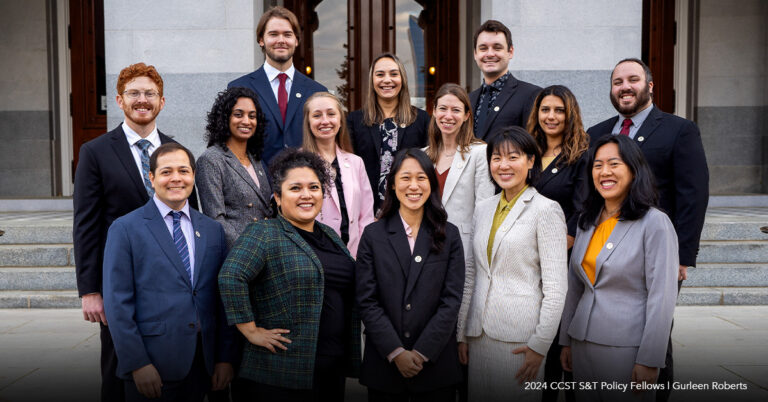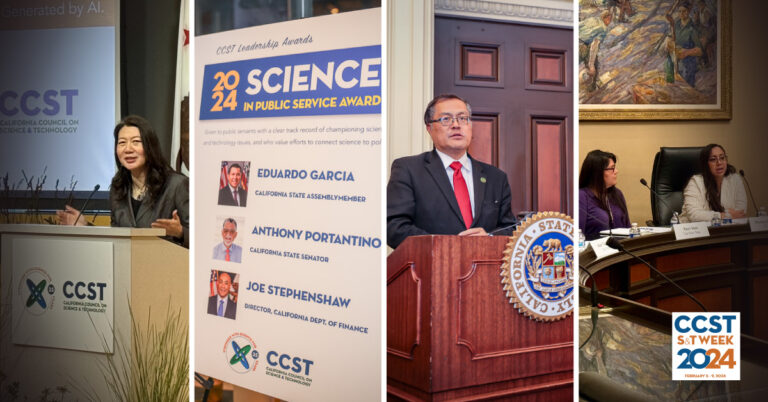Update: Applications for the CCST Science & Technology Policy Fellowship Have Closed
(Update: Call closed) CCST and Blue Forest Seek Experts on Links Between Forest Health, Wildfire Smoke, and Public Health
January 10, 2022 | Calls for Expertise, CCST Newsroom, Closed Calls | Contact: Teresa Feo, PhD

SACRAMENTO, CA—The California Council on Science and Technology (CCST) and Blue Forest Conservation have received funding from the National Forest Foundation, US Endowment for Forestry and Communities, and USFS’s Innovative Finance for National Forests (IFNF) grant program to produce a peer-reviewed report on the connections between forest health and public health.
Public health impacts of wildfire smoke are a severely under-represented and under-quantified impact of recent catastrophic wildfires. The economic impacts of wildfire smoke to public and private health systems cost billions of dollars and disproportionately impact disadvantaged communities. This study aims to explicitly make the connection between forest management, wildfire smoke, and stakeholders that pay high healthcare costs, to identify potential motivations for investment in activities that reduce wildfire risk.
The report will include a literature review of existing tools for tracking and forecasting the connections between the restoration of forests and other fire-influenced ecosystems (e.g. chaparral, oak woodlands), smoke produced by wildfires (including uncontrolled, prescribed, managed, and cultural wildland fires), and the public health impacts due to population exposure to wildfire smoke. Additionally, the report will engage public and private healthcare stakeholders to identify key information needed to motivate their inclusion of wildfire smoke-related health impacts in their fiscal forecasts, and potentially prompt their financial participation in forest restoration as a means of mitigating the healthcare costs of wildfire smoke. The report will identify gaps between current knowledge and the needs of healthcare stakeholders and make recommendations for new research, tools, and resources to address these knowledge gaps.
Questions likely to be addressed in this study include, but are not limited to:
1. What are the existing methods, metrics, and tools for tracking the health impacts of population exposure to wildfire smoke?
2. What are the existing methods, metrics, and tools for tracking or forecasting wildfire smoke based on the condition of forests and other fire-influenced ecosystems?
3. What are the motivations and information needed for healthcare stakeholders to incorporate smoke-related health impacts in their planning and fiscal forecasts?
4. What are the gaps in existing tools, resources, and knowledge to be able to connect investments in forest health with savings in healthcare costs?
CCST seeks nominations of individuals (including self-nominations) with expertise relevant to the following topics to serve in various roles in support of this study, such as steering committee members, authors, report monitors, peer reviewers, and subject matter experts:
- Management practices for restoring the health of forests and other fire-influenced ecosystems
- Linkages between forest restoration, including fuel reduction treatments, and changes in wildfire behavior
- Linkages between wildfire behavior and wildfire smoke
- Wildfire smoke transport, tracking, and forecasting methods, models, and data
- Methods and tools for tracking population exposure to wildfire smoke
- Public health interventions to reduce exposure to wildfire smoke
- Health impacts of exposure to wildfire smoke
- Costs of wildfire smoke health impacts
- Frameworks for systematic monitoring of public health impacts
- The healthcare industry and risk modeling
Please submit names, affiliations, relevant areas of expertise (see bullets above) and contact information for individuals who are qualified to serve in support of this study. Self-nominations are welcome.
Please click here to submit your nominations.
For any questions about this report, contact Teresa Feo.
###
About the California Council on Science and Technology
The California Council on Science and Technology is a nonpartisan, nonprofit organization established via the California State Legislature — making California’s policies stronger with science and technology since 1988. We engage leading experts in science and technology to advise State policymakers — ensuring that California policy is strengthened and informed by scientific knowledge, research, and innovation.






